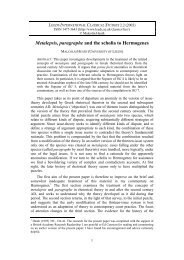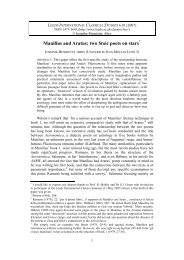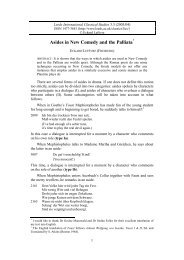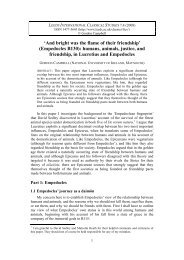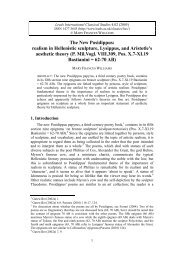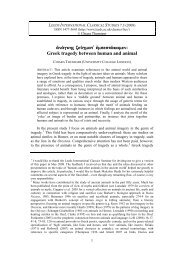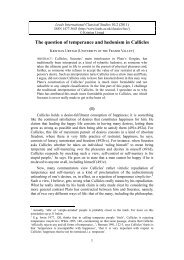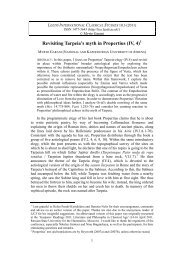Teiresias, the seer of Oedipus the King - Leeds International ...
Teiresias, the seer of Oedipus the King - Leeds International ...
Teiresias, the seer of Oedipus the King - Leeds International ...
You also want an ePaper? Increase the reach of your titles
YUMPU automatically turns print PDFs into web optimized ePapers that Google loves.
HANNA M. ROISMAN, TEIRESIAS, THE SEER OF OEDIPUS THE KING<br />
At two points in <strong>the</strong> scene <strong>Teiresias</strong> <strong>of</strong>fers explanations for his recalcitrance.<br />
The first explanation is that: ‘Of <strong>the</strong>mselves things will come’ (¼xei g¦r aÙt£,<br />
341).The second is that ‘It is not destiny that you should fall by me, since Apollo,<br />
whose task it is to work this out, is sufficient’ (oÙ g£r se mo‹ra prÒj g' moà<br />
pese‹n, peˆ / ƒkanÕj 'ApÒllwn ú t£d' kpr©xai mšlei, 376f.). These<br />
assertions convey his reluctance to be <strong>the</strong> bearer <strong>of</strong> bad news, but <strong>the</strong>y are not<br />
really very informative. Even if <strong>the</strong>y make sense to <strong>the</strong> outer audience—I will<br />
return to <strong>the</strong>ir sense shortly—<strong>the</strong> inner audience can hardly be expected to<br />
understand <strong>the</strong>m. To <strong>the</strong>m, <strong>Teiresias</strong>’ unwillingness to make a full and<br />
straightforward disclosure <strong>of</strong> what he knows must be incomprehensible, and he<br />
comes across as recalcitrant, egotistical, and unwilling to help his community out<br />
<strong>of</strong> its dire straits. 6<br />
Why this characterization? To my knowledge, nowhere else in Greek<br />
literature is <strong>Teiresias</strong> depicted as so irritating and provocative a figure or presented<br />
in such a negative light. I would like to suggest that this depiction enables<br />
Sophocles to use <strong>Teiresias</strong> to fulfil important dramatic and <strong>the</strong>matic functions in<br />
<strong>the</strong> play.<br />
There are two key dramatic functions. One is to create dramatic conflict.<br />
<strong>Teiresias</strong>’ entrance on stage in line 300 ushers in <strong>the</strong> first conflict in <strong>the</strong> play. Up<br />
until <strong>the</strong>n, <strong>Oedipus</strong> had spoken to <strong>the</strong> Priest, <strong>the</strong> Chorus, and Creon. His speeches<br />
to <strong>the</strong> first two have <strong>the</strong> quality <strong>of</strong> soliloquies ra<strong>the</strong>r than exchanges. His dialogue<br />
with Creon, with whom he will exchange harsh words later in <strong>the</strong> play, is<br />
businesslike and unemotional, despite its being laden with unconscious irony. But<br />
<strong>Teiresias</strong>’ reply to <strong>Oedipus</strong>’ heartfelt supplication with what, to all appearances, is<br />
egotistical irritation, his gallingly protracted and opaque release <strong>of</strong> information,<br />
and his own bad temper, which he demonstrates several times in <strong>the</strong> course <strong>of</strong> <strong>the</strong><br />
scene, set in motion a mounting clash between <strong>the</strong> two strong-minded figures,<br />
which intensifies as <strong>the</strong> scene proceeds. This clash creates <strong>the</strong> dramatic tension<br />
that holds <strong>the</strong> audience’s interest.<br />
Creating dramatic tension in this manner is a stroke <strong>of</strong> <strong>the</strong>atrical genius. The<br />
plot <strong>of</strong> Sophocles’ <strong>Oedipus</strong> <strong>the</strong> <strong>King</strong>, which traces <strong>the</strong> course by which <strong>Oedipus</strong><br />
discovers what everyone in <strong>the</strong> outer audience knows, is potentially soporific.<br />
That audiences do not fall asleep and that <strong>the</strong> play still rivets <strong>the</strong> attention <strong>of</strong><br />
audiences some two and a half thousand years after it was written is a credit to <strong>the</strong><br />
way in which Sophocles develops situations so as to pit characters against one<br />
ano<strong>the</strong>r, even where one would not expect a clash, as one would not between a<br />
that keeps <strong>the</strong> outer audience, especially <strong>the</strong> ancient audience that knew <strong>the</strong> basic story, on <strong>the</strong>ir<br />
toes: ‘The truth is trembling on <strong>the</strong> brink <strong>of</strong> being told. But for those who know a secret <strong>the</strong>re is a<br />
greater excitement than to see <strong>the</strong> ignorant just missing hearing it. You can bring <strong>the</strong> thing closer to<br />
<strong>the</strong>m than that: by showing <strong>the</strong> ignorant actually hearing it in circumstances that cause <strong>the</strong>m to<br />
disbelieve it, so that <strong>the</strong>y hear it and miss hearing it at <strong>the</strong> same time; that is <strong>the</strong> height <strong>of</strong> this kind<br />
<strong>of</strong> excitement ... This is a triumph <strong>of</strong> dramatic understanding.’ See also <strong>the</strong> discussion by Gould<br />
(1988) 149-53. For <strong>Oedipus</strong>’ anger and <strong>the</strong> possibility that <strong>Teiresias</strong> intentionally elicits <strong>Oedipus</strong>’<br />
anger and intentionally is unclear in his words see Ahl (1991) 75-102.<br />
6 It is <strong>the</strong>refore unclear why Webster (1969) 79, maintains that it is <strong>the</strong> care for <strong>the</strong> city that makes<br />
<strong>Teiresias</strong> speak. For <strong>Teiresias</strong>’ dereliction <strong>of</strong> his duty to <strong>the</strong> community see Gould (1988) 149.<br />
4



